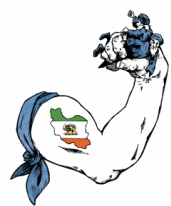Topic: Immigration
We have all heard it.
CENSORSHIP!
They are trying to muzzle the Press!
Well most of the time you hear this cry directed at the sinister Rightwing Neo-Con Conspiracy, it is uttered by those who do not even understand what censorship really IS.
Now if they want to LEARN?
Here is a good way to do so.
Journalists Stop Investigating Organized Crime
Submitted by editor on August 22, 2005 - 1:58pm.
By Susana Hayward
Source: Philadelphia Inquirer
NUEVO LAREDO, Mexico - A drug war is ripping apart northern Mexico, but you won't find many details about who's behind it in the local newspapers. Journalists - after their colleagues have been killed, kidnapped, and threatened with death - have stopped investigating organized crime.
"It's the new trend of drug gangs: Journalists are warned, paid off or killed," said Daniel Rosas, the managing editor of the daily El Ma?ana, the oldest newspaper in this border city south of Laredo, Texas. "Drug battles have become bloodier, and gangs have no code of ethics. They don't respect human life; why should they respect reporters?"
El Ma?ana, founded in 1932 after the Mexican revolution with a motto to promote freedom of expression, has been self-censoring itself since its editor, Roberto Javier Mora Garcia, was stabbed to death on March 19, 2004.
Earlier this year, a former El Ma?ana reporter, Dolores Guadalupe Garcia Escamilla, died after being shot outside her home. She'd gone to work for a radio station and had named some officials as involved in the drug trade before she was killed.
El Ma?ana, whose walls are covered with images of past front pages, now reports only official news, its editors said. Other major newspapers along the northern frontier followed suit after their reporters were killed, kidnapped or threatened. They said corruption, impunity, and lack of police support made it almost impossible for journalists to research rampant violence accurately.
That means they don't follow up on the 173 people who've disappeared since last fall throughout the state of Tamaulipas, deemed by journalism organizations the most dangerous place for reporters to work in Mexico. Twenty-three others missing are Americans from Texas.
There have been at least 108 murders since January.
"We still inform the community of what's happening but are more careful of what we say. It's a painful decision. We are hostages to self-censorship, and it's worse than censorship," said El Ma?ana's publisher, Ramon Cantu Deandar.
Cantu, 39, has grown cynical about covering organized crime in this city of nearly half a million people.
"What's the point of investigating? We can't win. Drug mafias have billions and billions of dollars. They own this city: They buy police, government officials, investigators, you name it," he said. "It's better to write a crime novel."
The only newspaper that's still digging into the drug underworld is the Tijuana weekly Zeta, whose owner, Jesus Blancornelas, is something of a legend in Mexico and travels with bodyguards and bulletproof cars. Zeta's editor, Francisco Javier Ortiz Franco, was killed June 22, 2004, after the paper published the names and photos of people it said were members of the Tijuana drug-trafficking cartel.
Blancornelas said he understood the reticence of his fellow journalists.
"They are unprotected, without security," he said. "You can't blame them."
According to Mexico's nongovernmental National Center for Social Communication, the country ranks first in Latin America in reports of attacks on journalists, surpassing Colombia. Journalism organizations are calling for an independent prosecutor to investigate crimes against reporters here.
In the last 18 months, six journalists have been killed along the border: four in 2004 and two in 2005. Two other journalists have been killed elsewhere in Mexico.
Their editors regarded the six as hard-core investigators of the prolific violence that has erupted since 2003, when the leader of the Gulf Cartel, Osiel Cardenas, was jailed, sparking a battle for control of Nuevo Laredo, the largest land port to the United States and the crucial crossing point to Interstate 35, which runs north across the United States to Canada.
"We're completely alone in this business. We don't trust any state or federal authorities, and crime keeps on growing. It's more visible, and there's seldom any punishment," said Jorge Morales, the editor of El Imparcial, in the Sonora state capital of Hermosillo, south of Arizona. The company also owns two papers in Baja California.
Morales dismantled El Imparcial's investigative team after one of its crime reporters, Jose Alfredo Jimenez Mota, disappeared April 2 after telling colleagues he had to meet a source he was afraid of.
In the newsroom of El Ma?ana, a memorial to Mora was taken down long ago. Cantu said it was simply too sad for the staff to be reminded every day of what had happened.
Police now guard the entrances to the paper's two-story headquarters, though there are few other signs of stepped-up security. It wasn't till early this month that a new editor took Mora's place.
"I have to live up to Mora's reputation as a moral, ethical and probing journalist," said Omar Eli Robles, who'd been a reporter at Monterrey's El Norte newspaper. "Of course, I'm a little afraid, but danger is part of the job."
Asked, however, if he'd tell his reporters to go back to investigating drugs and corruption, he demurred.
"When and if this war ends," he said.
Posted by ky/kentuckydan
at 6:32 AM CDT
| Post Comment | Permalink | Share This Post
Updated: Sunday, 3 June 2007 6:55 AM CDT
| Post Comment | Permalink | Share This Post
Updated: Sunday, 3 June 2007 6:55 AM CDT

















